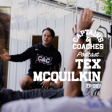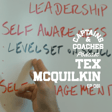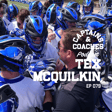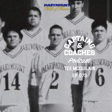Choosing Gratitude and Self-Authorship
00:00:00
Speaker
take perspective on where you are, to choose gratitude about it, um and to contribute meaningfully is a direct path to enjoyment, not just of the thing that you're participating in right now, the context you find yourself in right now, but is also a pattern of thinking, a skill, a behavior, a pattern of like self-authorship that transfers on and on and on and on until, I don't know, you your children put you in a nursing home and you've got to get up every day and figure out, how would I like to handle today?
Podcast Introduction and Guest
00:00:37
Speaker
What separates teams that thrive under pressure from those that crumble when it matters the most? Welcome to the Captains and Coaches podcast where explore the art and science of leadership through the lens of athletics and beyond. I'm your host, Texel Koukian, and today we're going inward. with a psychology of peak performance with Dr. Kara Miller, the developmental coach who specializes in self-authorship and formational leadership.
00:01:03
Speaker
Dr. Miller works with everyone from high stakes corporate execs to elite athletes. teaching them how to author their own stories rather than be victims of circumstance.
00:01:13
Speaker
In this conversation, we'll unpack the culture killers that destroy team chemistry, entitlement, resentment, and the fear of trying, and explore how coaches can train not just behavior, but the thinking patterns that drive lasting transformation.
00:01:29
Speaker
whether you're leading a team of young athletes coaching or simply seeking to understand how to develop unshakable self-control this episode will challenge how you think about growth leadership and human potential now let's hand it off to dr miller to help us raise the game ready ready and great long time friend i gotta thank logan gelbert years back for introducing us and so many adventures in between so many conversations yeah challenges I face that I think, what would Kara do?
00:02:02
Speaker
think you need to make a bracelet. Never going to happen, brother. Never going to happen. I mean, that it's a big goal for
Studio Setup and Ambitions
00:02:11
Speaker
this year. I think just a ah whole just line of clothing, merch branded.
00:02:19
Speaker
Well, let's see if what we talk about holds water first and we can let the people um lead power to the people. um We'll let the people decide what they want and then supply and demand. if they If there's demand, we will figure out something to supply.
00:02:33
Speaker
But if we need merch, I i think you've already been in like some fantastic merch spaces. I mean, I look around my office and the stuff I have got, i mean, directly came out of your wheelhouse or Logan's.
00:02:46
Speaker
So, yeah. Just wait till the podcast sponsor Yeti sends you a little treat. Fantastic. Yeti, right on.
00:02:57
Speaker
but awesome Texas, born in Dripping Springs. So speaking of holding water, I've moved a plant into the podcast studio. Brother, your lungs are thanking you. Your brain is thanking you because our dear friends, the plants, are working while we're working and they're working while we're not working.
00:03:18
Speaker
So yeah, maybe I need a nursery sponsor, like a plant nursery sponsor. I can line that up. I'm great at networking. Well, yeah, well, congratulations, because being a plant parent is a skill.
00:03:32
Speaker
So congratulations. I'm proud of you. I'm learning that quickly. I will ah say one aside. I've got so much fruit, lemons, limes, mangoes that I started just planting all these seeds.
00:03:46
Speaker
So I've got a ah whole system in my backyard right now. What? Yeah, i'll I'll send you some photos after our our podcast, but a mango, who would have known?
Understanding Self-Authorship
00:03:59
Speaker
interesting... Growing in Texas. Growing in Texas. And avocados. Luke knows very well. We made a bet years ago. Oh my gosh.
00:04:09
Speaker
The... yeah Speaking of plants and growth, I want to talk about a formational life. This is what we call a segue in the biz. Fantastic. Well done. That was very smooth.
00:04:20
Speaker
Thank you. I'll hand it off to you here for a formational life and self-authorship. Some beautiful work that you do. Oh, yeah. I'll start with self-authorship because that one's pretty straightforward. Yeah.
00:04:35
Speaker
um The fundamental belief that you are the narrator of your thought life and of the actions that you take in your behavior, um in response to your thought life, that's self-authorship.
00:04:58
Speaker
um Picking up the pen, however you want to use the metaphor. um Constructive developmental psychology is what we would call it technically, and that is that you are actively always constructing a story about what you are experiencing.
00:05:17
Speaker
So you're constructive in that regard. You're the narrator. You're you're creating a narrative about what you're experiencing. And then developmental is the ability to accumulate experiences, accumulate ways of thinking um that they compound over time. so They don't leave an old self behind you, which is kind of a popular way of thinking of things like dust off your old self and move into a new self.
00:05:51
Speaker
Constructive developmental psychology would say, actually, you're including everything you've been. You've included, you're including all the ways of thinking that you had in order to move into an expanded or more expansive way of looking at your life and your thoughts and the story that you're telling about the experiences that
Formational Life and Growth
00:06:13
Speaker
you're having. And the more awake you are to the fact that you are constructing, you are narrating, you are self-authoring the way that you see the world, the way that you act in the world, the way that you grow or change or transition or expand in the world,
00:06:30
Speaker
The more responsibility for that you take, the more awake and aware you are to that, the more choice you have. And most of us are looking for more choice, more option about how we move, who we're with, how we behave, what we achieve, um and our general contentment about who we are and how worthy we are to to be in the places that we live, that we work, that we play.
00:07:00
Speaker
And um so that self-authorship belief is is right at the center of that. And in order to live out that belief, it requires you to practice um a life that is reforming um all the time. So a formational life is understanding that one way that you approach the world is it has been formed by what you've been through and how you've thought about it, how you've narrated it, how you've made sense of it in the past.
00:07:36
Speaker
And that if you'd like to expand and grow and offer yourself more options and more power and more self-control, um all the things that we really want is virtues.
00:07:49
Speaker
As people, as family members, as leaders, um as athletes, we want more self-control. And more self-control and more choices about how we move and how we think require more self-authorship, more formational work where we're forming and reforming to the point of transforming ourselves.
Talent vs. Discipline
00:08:14
Speaker
um how we think about the experiences that we have and how we act in response to the way that we think about that, the story that we're telling ourselves about that. And the good news is that with me, it's always going to be an infinite game.
00:08:29
Speaker
There is no arrival.
00:08:33
Speaker
No, and that's, that's why I love athletics, especially at the high school level. Yes, you make varsity, the work just begins. Once I get this college scholarship, the work just begins.
00:08:45
Speaker
yeah So it is that that infinite game and and all these lessons, all these seeds that we plant to bring it back to our fruits. Yeah, they they truly grow and are expressed in adulthood, both yeah for better or for worse.
00:09:01
Speaker
right? Coaching scars or influence or shames that you then were were told, the story that you were told about yourself as an athlete. I know countless of people that have held on to that tale into their professional realm.
00:09:16
Speaker
And unfortunately, those those shame, those self-limiting beliefs, they they have to work very hard to break through those. So I love this picture that you're painting with these keywords here.
00:09:30
Speaker
Yeah. And I mean, the fruit that you bear, um it does reflect the DNA, you know, that you started with, for sure.
00:09:41
Speaker
um And we also know, just to run your metaphor out, that all kinds of fertilizers, all kinds of composting, all kinds of treatment, context, conditions. I mean, they even say if you talk to your plants that they'll grow better, right? Like that's old science even.
00:10:00
Speaker
and um And so we know there are lots of stages along the way where you can influence more and better fruit. And I mean, even to the point where if things are have really begun badly, you can graft on an entire new you know side of life so that, you know,
00:10:21
Speaker
what was there is still you know useful to what you're becoming. And i think there are a lot of hopeful trajectories when we're talking about ah formational life or self-authorship or taking radical responsibility over the way that you make sense of the experiences you have or the people that you're around or the environments you have.
00:10:47
Speaker
you end up in you start to realize that you get to choose and and design those places um for for healthier fruit, for different types of input and influence so that your you are growing differently, you are bearing but different fruit and that that isn't luck.
00:11:09
Speaker
And so you know that, that um that your training you know comes way luck or you know being in the right place or natural talent or something like that, because we all know people with extreme natural talent or extreme privilege or you know position and their training, their consistency, their disciplined life does not match the natural talent or the natural privilege. And it doesn't come to
Leadership and Team Dynamics
00:11:42
Speaker
and fast In fact, it's wasted. which maybe is the most offensive thing to someone who is so disciplined, right? Or so well dialed into their own responsibility taking and their own self-authorship. Nobody drives those people crazier than somebody with all the privilege and all the natural talent who doesn't develop it, who doesn't work at it, it is inconsistent. I mean, that's right. mean, you tell me that you're you're better suited to say.
00:12:12
Speaker
we We call that the curse of the gifted. okay They don't know how good they are athletically. it Sport or task or art or music just comes too easy to them. Okay, yes so Then it is, ah, that's boring.
00:12:26
Speaker
That's too easy. yeah Yeah. So then, unfortunately, this is a, ah it's called a coaching paradox. This is a Logan Galbraith-ism where you start to want it more than your kids.
00:12:40
Speaker
And you create this, this toxic relationship, which i I want to get into this sense of resentment for your own athletes, because they have all the talent in the world.
00:12:52
Speaker
You want it more than them. And there's a friction that that is born, unfortunately. oh Well, I, that's a deep breath. Okay. No, lead me slow. Lead me slow there.
00:13:05
Speaker
oh Reason i brought you on an expert in the field. I want to talk about culture, killers. I've been coaching for 16 years. I've been a part of a team, all different teams, all different levels, all different sports.
00:13:21
Speaker
And some we had success, some we had potential, and some was just an all out just just blew up. So I've reflected a lot on my coaching career getting into this because how many lessons did I just forget about and not know there were a lesson until some reflection?
00:13:41
Speaker
Yeah, there was there was themes, there was connections, there was individuals that then just their attitudes spread throughout and we ignored it until it was all too late.
00:13:53
Speaker
And then before we knew it, a whole team is is is washed away ah when the going got tough. So I've been making this list, envy, resentment, ah just a ah lot of our natural human tendencies and thoughts.
00:14:08
Speaker
And then this past season, the biggest one that I experienced that I guess existed, but I didn't have like a grasp on the power of it, but entitlement.
00:14:20
Speaker
So we're just the, yeah, I was a new coach coming into a program and and in place, was like, hey, you're the best player. Like you don't have to go to practice, like just show up for the games.
00:14:35
Speaker
I wasn't having any of that. Yeah. that just That's not how I operate. So then would put pieces and tools in place to try to change and shift this culture.
00:14:47
Speaker
But there was a lot of pushback and fight. And at the end of the day, it's like, well, the best players are going to play. And it's like, man, well, we've we've gone too far. So yeah really started to shape ah how How do I attack this? What is a formational life, a perfect team?
00:15:07
Speaker
And how do we have this this gap there? And how can I start to build this over time or recognize these signs early? Because there was was were signs, but again, new to the program. And I'm like, oh, that's weird.
00:15:21
Speaker
But then I should have said something then. And I didn't, unfortunately. um But i I didn't know what I didn't know. Now I know if I start to see this attitude, behaviors, beliefs, what the kids are saying about their teammates, I know where it goes now. So i yeah, it's unfortunate, but that's why I reach out to experts is to help me understand. i don't just bang my head against the wall going crazy. How do I reach these kids?
00:15:48
Speaker
Yeah, right. Well, And it's interesting, I mean, i ah shared with you, my daughter plays on a high school golf team. and um And when I drop her off to practice, like I do, um I'll say something like, um you know, have a good time or something.
00:16:11
Speaker
and um And I've caught myself now saying, um you know, have a great attitude. Like doesn't matter what happens, scoring, putting, ah driving, you know, whatever it is, even contact with the ball, um you know, enjoy your time, enjoy your teammates, have a great attitude.
00:16:33
Speaker
Um, and she, she cannot argue but with me about that. Like, oh, I can't hit that goal or, you know, well, I, I won't score that low or rare whatever. No, no, no, no. There's really, there isn't any response to be the most enjoyable, you know, player on that team.
Positive Attitude in Teams
00:16:58
Speaker
and, and see how that feels, see what it feels like to make that your goal. um Yes, you're going to play the sport. Yes, you're going to follow directions. Yes, you're going to participate.
00:17:08
Speaker
um You're going to look sharp. You're going to represent your school, you know, whatever. But also enjoy your time by by being a great human, you know, show up show up ready to do that.
00:17:21
Speaker
And um it's it is, i think it's totally lost. It's totally lost. I think people need to be told that before they get on an airplane. I just got off four airplanes. I think everyone on that airplane needed to be told, hey, go be a great human.
00:17:37
Speaker
You know, enjoy your time on that, you know, amazing piece of technology. And and try make your best effort to enjoy the folks around you and not make it a bad day for them.
00:17:48
Speaker
You know, just let's let's just give that a try. You may get a six out of 10 on that thing. But like, hey, um that's foundational. It's lost. I will tell you, um corporate teams need to be told, um fix your face.
00:18:05
Speaker
We're sitting in a um evaluation meeting. and it's a private equity group. Let's just pick something super sophisticated and like out of our stratosphere. Okay. Very high stakes decisions.
00:18:18
Speaker
Um, if you come in and you have a snarky look on your face when someone else is presenting their analysis, like we are done, we are already toast. So what, like, why is it that the foundational fundamentals of, I mean, my dad or my grandpa would say attitude makes the day.
00:18:39
Speaker
um what, Where did we lose that? Because truly the entitlement or the um antagonistic, you know, stances, ah those those stem from not having a great attitude, like not having a positive just countenance about where you are,
00:19:03
Speaker
um I'm sure that could include gratitude, even if you wanted to stretch a little um of, wow, this is amazing. I mean, I'm not working in a coal mine. I'm sitting on a lacrosse field and I'm listening to some instruction about how to run a drill that's going to improve my conditioning and maybe make it possible for us to win a game.
00:19:21
Speaker
So pretty cool. Okay, that's thought number one. Number two, interesting. I mean, I have some influence. You know, I'm not invisible. um I can make this go one of several ways.
00:19:35
Speaker
So i think I'll keep it moving in the right direction. um So those sound really, really fundamental. But they're they they are foundational and for any group of people trying to accomplish any task.
00:19:50
Speaker
And young people are no different. I mean, being reminded of how to sort of take perspective on where you are, to choose gratitude about it, um and to contribute meaningfully is a direct path to enjoyment, not just of the thing that you're participating in right now, the context you find yourself in right now, but is also a pattern of thinking, a skill, a behavior, a pattern of like self-authorship that transfers
00:20:23
Speaker
on and on and on and on until, I don't know, you your children put you in and nursing home and you've got to get up every day and figure out, how would I like to handle today?
00:20:35
Speaker
Am I going to just have a bitter face on my you know my rounds in the morning? Or you know what this is my choice. And there's a bunch of other people here.
00:20:46
Speaker
Certainly, they're going to have some reflection of me through the day.
Contributing Positively to Teams
00:20:52
Speaker
people working around me, it's their job. um Who would I like to be to them?
00:20:57
Speaker
And what kind of influence would I like to have or contribution would I like to have wherever I go in this world from whatever role I'm in, um I don't know that sounds pretty dang basic, but it is the foundational thing and it is lost.
00:21:14
Speaker
So I literally taught this to an insurance company two weeks ago and we had an offsite and I interviewed everybody and the presentation, the findings that came out of that very complex senior team was everybody needs to show up better.
00:21:32
Speaker
Everyone is slouching. Everyone is snarky. Everyone is dismissive, um and you make bad business decisions as a result.
00:21:44
Speaker
So there's that's like a future projection of we show up to this lacrosse meeting, we show up to ah practice, and how does everyone show up?
00:21:57
Speaker
It's our choice. It's our choice and our results. There's way too much data and research to tell us that this is true, like way too much, that your results will increase if your intention about how you contribute is primary.
00:22:18
Speaker
So if you're paying attention to how you contribute, your results will increase because of purely intention, purely focused, purely like just putting your brain cells on the group or your contribution to the group.
00:22:34
Speaker
Wow. That was a long thing, but Am I getting at where you're at here?
Coaching and Conflict Management
00:22:39
Speaker
Yeah, it's we're we're synthesizing almost a ah step by step. Here's how to think.
00:22:45
Speaker
Yes. They're still free to think whatever they want, but here's how how to think. So taking perspective. Train to think. Train to think. How to train your thinking because it will not arrive. How to think it won't.
00:23:00
Speaker
How to train your thinking, that you can practice. Time out. Let's take a minute to talk about the Old Bull Training Program. If you were like me, you were bored with your training, you were extremely busy, you were beat up from years of athletics or just getting after it in the gym, and you were looking for every excuse not to train.
00:23:19
Speaker
Our solution, the Old Bull Program. This is a program that eliminates all excuses and it's fun. It's the program that I am following along. I'm writing it for myself and giving it to you and I'm with you every step of the way, coaching your movements on the program, guiding what weights that you choose.
00:23:38
Speaker
This is a choose your own adventure, super fun and enthusiastic program. what it's based off of six week cycles, two required days each week, two dumbbell based strength days each week in case you have to travel, and then a max heart rate, and then a fun day, a fun run, ruck, or local high school track sprint day.
00:23:58
Speaker
so this is what i'm following you have freedom to move the days around to best fit your schedule in case you have to travel we got sexy fridays getting after it with some fun bodybuilding as well as an athletic strength day on that other dumbbell deck mixing up the barbell movements that target achy knees ankles hips lower back so we're still able to lift heavy but we're manipulating your body to then repair itself and restructure so no longer lifting with pain through the podcast we're offering you one month 50 off check out the link in the show notes for the old bull program on old bull and use the code p-o-d-b-u-l-l that's pod bull for one month 50 off
00:24:46
Speaker
Come and join us. Now, back to the show. Ready, ready, and break. We as coaches are modeling the behavior, so we have to follow this as well. And that's that's a big thing for the the coaching staff of Amon.
00:24:59
Speaker
Just rules are no coat no cursing. If a kid curses, 10 push-ups. If a coach curses, 10 push-ups. Because how we're going to treat referees...
00:25:11
Speaker
is going to be how we're training our kids to teach and react to authority figures. when the the the ball doesn't bounce your way, are you going to throw your hands up and complain or next next play, next opportunity, let's go.
00:25:29
Speaker
um So in a sense, if we can just fundamentally train them how to think, then we're putting ourselves in a better position to train them how to act. versus yelling at them for acting just like we did.
00:25:43
Speaker
yeah Right. A hundred percent.
Training Athletes' Decision-Making
00:25:45
Speaker
Well, and there it is different. um Telling them how to think or telling them how to act is, is usually as far as this goes.
00:25:56
Speaker
So a coaching staff or a teaching staff or, um you know, managers, They'll set sort of a behavioral standard and they'll say, here's here's how to act, here's how to talk, here's how to behave.
00:26:14
Speaker
um and And we expect you to comply. So what you've taught is someone, you know, you've taught someone to look at what's what's being asked of them and how to achieve that.
00:26:29
Speaker
um The real formational angle on this is, to train them how to... how to ah Okay, let me see how I want to say this like very clearly.
00:26:44
Speaker
um How to train their thinking, how to train their behaving, how to train their talking.
00:26:55
Speaker
So it becomes like an operating system that you use when you're talking. It's not necessarily just a game, like a game plan or a blueprint for how to talk.
00:27:08
Speaker
It's how do you think about talking? And so there's, it's very subtle, but I will say young people are not too young developmentally to understand the difference here.
00:27:23
Speaker
So the setting, the standard of how to behave, how to talk, how to react or how not to react, um that's the beginning. That's like the proxy or the example. So here here's kind of what it should look like, right?
00:27:39
Speaker
If your thinking and your talking is trained and disciplined well through things that you value that are important to you and that are effective in your context, then your talking will end up looking like this.
00:27:54
Speaker
Or your decision-making will lead you towards decisions like this.
Case Study in Self-Authorship
00:27:59
Speaker
So those are examples. They're not the um the blueprint or the script. so But that's subtle. like It's difficult to communicate that.
00:28:10
Speaker
um But I do know um i had a former colleague who had me work with him on his collegiate level lacrosse team, and um and they worked at this distinction because...
00:28:27
Speaker
People were showing up late. I mean, you know you're you're going to know the laundry list of things, right? The culture was suffering on this team. um And they were moderate to high performing.
00:28:40
Speaker
So... um you know, it wasn't like they didn't win some, um but they didn't win at all. And so there was room to improve. And he happened to be a developmental student and thought, I'm going to see if I can do this. I'm going to see if our winning and our statistics and all of that, if that would actually change positively, correlated to my ability to train them to think or train them to behave or train them to think about their behavior and their decisions. um and
00:29:17
Speaker
the short story is there is a paper about it and I'll share it with
Emotions in Leadership
00:29:21
Speaker
you. But um but yes, that um actually teaching them ways of thinking, teaching them self authorship, um teaching them to relate to one another as people who are all Being trained to make decisions, to um to to make ah make their language clear um and real, not throwaway language. There's a lot of throwaway language um in working and in sport um that clean up your language.
00:29:55
Speaker
um clean up your thinking, train it well, and let's see what happens. um And ah without giving away like who that team is, they won a national championship for their school and it had never been won by that school ever before.
00:30:10
Speaker
So it was quite remarkable. And it just so happened that it was a fabulous thesis for a paper, you know? So, um but what it demonstrated was this subtle difference So most everybody knows, let's set a standard.
00:30:27
Speaker
Let's teach them how to talk, how to make decisions, how to react to conflict or disappointment. um But not everybody is actually looking to train their thinking so that they know like that that's self-authored.
00:30:44
Speaker
So it's not compliance to ah blueprint, but it's actually teaching someone drafting skills. So- yeah We can talk more about how that but happens. But that's the that's sort of the application of a formational way of of training others, of bringing a team together, um of rooting out some of the things that you were talking about, which is unthinking, right? Like default language,
00:31:13
Speaker
um ah just replicating what you hear or see. um It's always low power, always low power.
Athletes and Identity Beyond Sports
00:31:22
Speaker
Yeah. then ah I mean, i I saw it. I just didn't know. I didn't have the the toolkit then to to approach it.
00:31:30
Speaker
Yes. One observation where and you know the best kids, the coolest kids on the team are always voted the team captain in high school. Oh, okay. For the most part.
00:31:40
Speaker
Yeah. And coaches can... place the appropriate people in, in, uh, in authority positions. But what blew my mind was, and I don't know when this happened, but trying yeah became not cool.
00:31:55
Speaker
So like, I don't care. i would, um, I just, I'm playing cause for fun, whatever. It doesn't matter. Whatever. What are you talking about? Like you get, you know, you can count the the senior games you have left in your career. You're not playing college on your hands.
00:32:13
Speaker
Like, you're gonna have these memories, but I feel that they're just afraid of failing and losing. So then throw this nonchalant attitude out there.
00:32:25
Speaker
And um yeah, but with self authorship, it's asking them how they want to who they want to be, what character, or connecting to ah like a superhero that they they got a passion for, or just putting them in a position to be the hero of their own story versus like, ah um'm I'm not going to go ask that girl. Yeah, it didn't come to me.
00:32:49
Speaker
Yeah, I'm not going to take this risk. Well, dude, good luck in life.
00:32:57
Speaker
Well, it's interesting because um success is cool. Um, I think we could argue, um, although excellence, which is usually required for success is less cool. Um, and I'm hearing you say that saying that you had to try saying that you had to pursue excellence in order to get success is somehow uncool.
00:33:28
Speaker
Um, And that is that there's a polished kind of like perception management um there that I think society wide.
00:33:43
Speaker
um The. I made it big um without even trying or whatever um is Yeah, that's somehow there that's there for sure.
00:33:56
Speaker
um and I guess in spite of all of the data around, you know, all of the stats of like how many shots did Michael Jordan have to miss in order to become, you know, a record holder in shots made or something, you know, like we all have access to that information.
00:34:19
Speaker
um You know, the, the incredibly elite athletes who will tell you it's, It's the drills.
Managing Resilience and Achievements
00:34:29
Speaker
It's the, you know, 100 touches on the ball a day. It's the like nobody becomes Usain Bolt, you know, in one day. And it's like, wow, what the heck? You know, like the guy has been running his whole life like Michael Phelps, like he didn't do anything but swim.
00:34:50
Speaker
So it's like all in in the face of all of that information that. people would still feel like success comes without some sort of commitment to pursuit or excellence or discipline um is a really is a real lie.
00:35:08
Speaker
um And I think one of the one of the symptoms that comes later in life, if you don't coach this or you don't parent this um or you don't enforce this, frankly, like that kind of thinking, and you don't really push it, um is what we see just as such an epidemic of, which is imposter syndrome, um which is sort of like, I got, I i am where I am but like, I'm not even sure that I controlled how I got here or um if I could repeat getting here again, or if I deserve to be here, or what if I'm not really who people think I am,
00:35:52
Speaker
um Or who I'm supposed to be? Like all of those kinds of questions, they all come out of a root of not knowing why you're doing what you're doing and not knowing what the results are or aren't accordingly.
00:36:07
Speaker
And so one really fast way to the center of that is to start watching for is what I'm doing getting me closer to some ideal or further away or maybe on track. um If I just take a moment in reflection to think about that, I could actually repeat anything that goes well.
00:36:31
Speaker
um I could stop doing anything that derails me. so Let's say you're a college athlete and you realize that living in the dorms staying up late, um eating crap, you know, every other meal or, you know, what you add on all the other variables.
00:36:54
Speaker
um If you start like tracking those things or just being cognizant of those things and then watching your results over time, you may learn what moves you ahead, what drags you back, what makes you feel. I mean, these are things we have to reteach adults because they never learned it.
00:37:12
Speaker
They never, nobody ever said, Oh, interesting. Maybe track how you're feeling after those choices. Or, um wow, you really performed well.
00:37:22
Speaker
What do you think contributed to that? um That is a direct... like a transferable skill that will serve you so well in adulthood. Like, I wonder why I made that sale, but that one didn't go well.
00:37:37
Speaker
Hmm. Like, let me just take a minute to look at what was the approach? What was the relationship? What did I offer? Like, maybe there's something repeatable in there for me.
Integrating Emotions and Rationality
00:37:47
Speaker
um But it's, I mean, verys just yeah it's easier to just, say yeah, I didn't make the sale. F that guy.
00:37:55
Speaker
He's wrong. Yeah, totally.
00:37:59
Speaker
Or coach doesn't know what he's talking about. Yes. Yes. So I feel that's a sense of protection. i've I've heard you speak before on the people fearing their own psychology, and this is very common with teenage males of viewing emotions as weakness.
00:38:20
Speaker
Mm-hmm. how can How can we articulate? And this is one one way I've aimed to do this. Instead of asking student athletes what they think, how do they feel?
00:38:31
Speaker
How'd that feel? So um I'm almost prompting them to give me a ah feeling ah that's going on there. and they give me a yeah if they give me like a ah technical thing that happened, it's like, that's not the question I asked.
00:38:47
Speaker
So then reframe it and just try to so help them sit in their feelings. Because I mean, it is valuable. I know as you grow an adult to feel what winning and success, to understand what this feeling of winning is, to understand what losing is. So now I can teach delayed gratification.
00:39:06
Speaker
Remember how that felt after that game. But if we're ignoring that and saying, Oh, the refs suck. Coach made the bad call. Then we're not sitting and losing and not realizing that I didn't do what I was supposed to do over the summer to help me succeed in the spring.
00:39:22
Speaker
That. What are you thinking to what are you feeling? Shift will be probably just speaking from someone who deals with adults all day long.
00:39:36
Speaker
the best gift you could give of a student athlete, a young person, period. um Because what that shift does is connect them not just to their emotional feeling,
00:39:52
Speaker
so that they can get a hold of what's desirable or what's repeatable or what's avoidable. Like I didn't like the feeling of disappointment. I didn't like the feeling of I didn't give it my all and so I didn't achieve it.
00:40:05
Speaker
um It doesn't just connect them to their emotional state, which you can use in a lot of different ways. It also connects them to their body and what we have a true epidemic of in adulthood is people very, very disconnected from their physical sensations, which are so intertwined with your emotional sensing, which feeds directly your rational mental faculties.
00:40:41
Speaker
So if you think you can reason out a problem, a relationship, a disappointment, a failure, an achievement, um only from that mental place, you are sorely mistaken because there are variables operating upon your mental faculties chemically, spiritually, emotionally, um that you have just dismissed.
00:41:08
Speaker
And so if you can connect a young person's thinking and reasoning with their body sensing and their emotional feeling.
00:41:21
Speaker
um You will have done just about, I mean, the best thing I could possibly think to gift all of the adults that I interact with.
00:41:31
Speaker
And so these are people who are at a professional level level, whether they're an executive, whether they're an elite athlete, whether they're an academic scholar, um they all are subject to what their body is telling them, um good or bad, distracting or motivating.
00:41:51
Speaker
Mostly it's distracting, spoiler alert, um what their emotions are doing, which usually are playing straight off of old tapes. So you've named it here in this conversation, what coaches used to say, what teachers used to say, what parents have said in the past, those tapes play on in the emotional being.
00:42:12
Speaker
And they, all of that serves as the backdrop for trying to be a reasonable decision maker. um Truly, truly the quickest way to become A clearer decision maker, a clearer communicator is to get a hold of your body and what it's telling you and your emotions and what they're telling you.
00:42:35
Speaker
And so the part of the formational life is who are the voices that are narrating my experience?
00:42:46
Speaker
Are they old voices? Are they trustworthy voices? um My body retracts and withdraws when someone raises their voice.
Overcoming Past Mistakes in Leadership
00:42:56
Speaker
um What's going on there?
00:42:58
Speaker
How do I get better self-control about my reactivity to that so that that doesn't derail my thinking or my compassion? um If someone shows um indifference or is they it's difficult for them to make decisions,
00:43:19
Speaker
um And I am immediately ah reacting by judging them and becoming annoyed by them. um Okay, I'm ah i'm derailed. Like if if my emotions automatically react to some sort of situation like that, and I don't have a hold of it, like, oh, that's interesting.
00:43:39
Speaker
I learned that. I know where I learned that. um I've lost my faculties. And so the very clear thinkers, the very clear communicators, who I would argue are the most valuable people on any team, um any staff, any organization in any family, um those people who are thinking clearly and communicating clearly, ah guarantee you they have done some sort of work
00:44:10
Speaker
to discipline and stay awake to and aware of what their body is feeling, what their emotions are experiencing and where that all came from.
00:44:20
Speaker
And that is so rare that somebody actually can talk about that, that somebody has that in hand um and can use it for, you know, clarity and to bring, you know, good ideas and, and good,
00:44:40
Speaker
Layers of impact about decisions. I mean, ah good recruiting. Oh my gosh. You want to talk about something that would be applicable for you guys, like recruiting decisions.
00:44:51
Speaker
Um, you want people who have their sensing and their body and their adrenaline in check. Um, you want their emotions, their memories, their associations and their judgments in check.
00:45:04
Speaker
so that they can make and accurate and rational recruiting decision that fills needs, not of themselves or their egos, but of the actual team.
00:45:18
Speaker
So what are the needs of the team in order to perform? We want people operating upon those or or considering those and clear out in as much as is humanly possible.
00:45:32
Speaker
our own sort of needs about what's going on in my body and what's going on in my emotions. um So you've you're nailing it. So go you are crushing it um like that that. It's it's truly a gift.
00:45:46
Speaker
It's truly a gift to young people because adults are having to relearn it. So maybe you should also be teaching adults. Well, selfless ah promo here. I do have a course on social emotional leadership and getting Why it's titled, why they're not listening.
00:46:05
Speaker
People, why are you not listening? And I'd argue, why are you not able to think? Like, what's your, ne well how to unlock your next level of like critical thinking of productive communication.
Emotional Regulation in Coaching
00:46:18
Speaker
Here it is. Listen to this dude. Spoiler alert, you're giving away my ending. All of it leads to responsible decision-making and situational awareness on the field.
00:46:29
Speaker
But then double spoiler alert, all of those tools are what helps you be responsible human being later in life. so Absolutely. Okay. Well, amen.
00:46:41
Speaker
You did it. You've done it. um' and And truly... I imagine this is true for you too, but certainly the data and research like bear it out.
00:46:53
Speaker
And that is that results do increase. Like you can see a measurable increase in positive results, whether it's underwriting decisions, you know, ah whether it's investment decisions, whether it's choosing a partner in life or whether it's winning more lacrosse games.
00:47:17
Speaker
The more you have this in hand, the better off your results will become, not just because magic, but because you knew at every increment how to adjust.
00:47:30
Speaker
Yes. And you're insulated and your, your confidence, your abilities, you're protected against others that are trying to then put resentment in their envy and their problems on you.
00:47:45
Speaker
So that's a big thing I want to hand to athletes. Okay. So when you do step up to the next level, And it's either unruly fans or coaches or bosses that then try to label you, try to put their stuff, their shamelessness down on you and push it down.
00:48:02
Speaker
You know exactly who you are and what you're capable of. And then you could find a place who's willing to pour water on you and help you grow versus just keep you contained.
00:48:14
Speaker
And there's there's so many... animal stories that are coming out. I don't know if you've seen the goldfish that's in a big tank swimming around and then they put a glass sheet of glass in the middle of the fish tank.
00:48:27
Speaker
Yeah. And then goldfish runs into it a couple of times and then they remove the glass and goldfish just stays in that second half. you seen that? Oh, no. And this the same with fleas. They took a bunch of fleas, put them in a jar.
00:48:42
Speaker
Then they put a lid on the jar for three days. i'll I'll send you these. Yeah. and Then they just unscrewed the cap and the fleas were limiting themselves to that that height.
00:48:56
Speaker
So it's it's very similar with people. And I've seen too many poor coaches, especially at the high school level. I've had them at high school. I've had them at college. I've worked with them.
00:49:08
Speaker
And it it's it's so frustrating. And a lot of the inspiration to even stand here and start this is to, yeah, just to go after them. um So what have been the unlocks so far?
00:49:23
Speaker
The define unlocks. Um, so if your observation is that let's take this, just this population, like high school coaching,
Creating Supportive Environments
00:49:33
Speaker
um, that they are experiencing limitations like these, um, the athletes, the coaches, um, et cetera, like what have been some of the unlocks or some of the experiments you've run so far that seem effective? Like they're, they're freeing people up or at least giving them perspective on the limitations.
00:49:53
Speaker
Right. ah The... So a lot of the the tools that I've been leaning into is it's called social emotional learning. So it's best based off elementary and child development.
00:50:05
Speaker
Erickson, Piaget are the two child development people that i i've yeah I've really come to admire. And then those are also the foundational fathers of adult development, like just so you know.
00:50:17
Speaker
So we're on the same page. And then there' there's a man named John Bradshaw, who is deep into shame. So just the the shame that bind you is his his book and he's got many others that then connects adult challenges, problems, ah ah addictions and that are anchored in in childhood.
00:50:39
Speaker
So understanding those but then asking questions to answer your question. Yeah. Asking coaches like would you follow you? Are you the coach that you want coaching you?
00:50:51
Speaker
So that that was a lesson taught to me. Raphael Ruiz is is the man's name. Yeah, totally. so then ah And then i i sometimes with younger kids, I match their energy.
00:51:02
Speaker
A common thing with coaches is to come over the top, right? If a kid is angry, well, I'm just going to come over the top and try to try to so i to bury you basically because i don't have the skill set then bring you down.
00:51:18
Speaker
So then matching energies. And then this is from John Bradshaw where he's got a scale one to a hundred or forgive me. This is Tim Fletcher. This is Tim Fletcher.
00:51:29
Speaker
yeah Scale of one to a hundred. So if a kid is in 80 to 90 to hundred, Then we need to do grounding exercise, which is breathing or exercise. We got to move in our limbic brain. They're caught in their limbic brain.
00:51:43
Speaker
We need to move in our bodies. So pushups, I will run with them. i won't say, hey, go take a lapse. Right. So I'll do physical fitness with them until we're at a seven and we're in our in our midbrain or a prefrontal cortex. And we can talk about this.
00:52:01
Speaker
But if I try to talk, if they're in a seven, if they're in eight to ten. They're not listening. And this is where we see NFL arguments of coach and player just blow up. They're both in tens right there.
00:52:15
Speaker
um If they're in a seven or ah a one, usually this these are ah just regressions in age. They're 16 and they're acting six.
00:52:27
Speaker
Okay, hey, let's shine a light on that behavior. yes And then if they're if they're acting out, what I've found is that it's it's usually they they're looking for a boundary, a barrier because they're not getting it outside of practice.
00:52:42
Speaker
Yeah. and then what i've I've come to, and I was this athlete, more acting in where almost on surface level, I'm cool. I'm doing everything that I've i've been asked to do. i'm I'm leading by example.
00:52:58
Speaker
But internally, i'm I'm a perfectionist. I'm grinding. I'm dying. I'm hurting myself and my whole internal system is collapsing on itself, right? Adult stress challenges.
00:53:12
Speaker
But then I've also seen kids that take their their stick and bang it against their helmet. Like that's acting in. They're acting out on themselves. Yes. So just observing and then trying to have different ah tools to then step in.
00:53:29
Speaker
Because there were years where it's I labeled that kid as a problem. like Avoid him, let him throw off. But no, therere they're acting out at practice.
00:53:40
Speaker
they That's where they need me the most. So i've I've come to change my stance on that where I got to intervene. I got to step in. yes if words If they're not at a point where words can, movement can.
00:53:54
Speaker
And so a lot of my lectures and presentations now combine movement and this social emotional leadership, I'm calling it. and Yeah, like i'm I'm getting fired up about it because I've made all these mistakes and these kids went into the real world.
00:54:09
Speaker
And I know that they acted that way or hurt themselves this way in the future. and I could have got it when it was a small, small dragon, right to use ah another children's book with the dragon before it became and took over the whole house.
00:54:26
Speaker
So yeah. Well, that's gracious. I mean, it's, ah I want to have grace for who you've been um and you know, what you learned then and then where it's driven you now, where it's driven your learning, where it's, you know, created the desire to expand, to be able to, the word I would use for what you were describing is, is to contain.
00:54:53
Speaker
And so um most of us are looking for a sturdy container. And that's a ah really strong psychology concept that's applicable from infant to the end.
00:55:06
Speaker
And, um and, Most of the time when we act out, we feel uncontained and um and we we don't feel held by either our current ability to to react and to hold ourselves in whatever the context is, or we feel like the structures around us or the people around us are not able to contain what we bring.
00:55:33
Speaker
And that's where the shame comes from, is I'm too much, um I'm a burden.
Young Leaders and Integrity
00:55:39
Speaker
um And interestingly, that has ah has a ah part in the entitlement expression, um which is if I don't truly feel deserving and worthy calm and content, well-contained and secure about where I am and who I am, I feel the need to over-demonstrate it.
00:56:07
Speaker
And so what people would think of as hyper-security, like unthinking, like they don't even think about whether they're secure or not. They're so entitled to everything. They think they will run the world.
00:56:19
Speaker
Um, It's actually an expression of, um I need to over claim that. I need to over claim the fact that i deserve to be here, that I deserve to get this because there is a quiet internal question about whether that's true or not.
00:56:39
Speaker
um People who have very successful people, I'll say, who have looked inwardly and really asked themselves, do I deserve to be here?
00:56:50
Speaker
Do I have what it takes? um Am I worthy of success and celebrating? And am I willing to do the work that's required to do that? Am I willing to take the difficult feedback about whether I'm getting closer or further from the goal?
00:57:06
Speaker
um Those people, they don't show up very entitled. They don't sound overly grandiose. um I mean, I'm thinking immediately of, you know, one of my favorite ah public figures, Scotty Scheffler.
00:57:21
Speaker
Anytime you ever hear him talk, it's, hey, I love the drills. I love the practice. um The feeling of winning is about two minutes long. And so I'm a little weird because I've worked my entire life to win some of these golf tournaments. And then I'm going to sit here on a microphone and I'm going to tell you that two minutes after that, I'm kind of like, well, who am I? Like, what am I doing here? Do I deserve to have this? Like, I don't know. People are treating me really. And then But he can answer his own questions because he's done the work.
00:57:52
Speaker
He's tried to figure out emotionally, like, what am I getting from this? What am I trying to resolve by driving myself, you know, to these lengths and these requirements?
00:58:03
Speaker
um I think I have that in hand. And what's the deeper meaning of that? Like, how do I control my body's response to disappointment or um or success?
00:58:14
Speaker
um How do I not allow those things to flood me? um And then how do I think carefully about what's required for that kind of success? Well, I know what's required and I know what doing more of that gets me.
00:58:28
Speaker
I know what doing less of that gets me. um I mean, you see like the whole conversation is a different energy than what you were describing about students that are like, well, I'm the best and I have a spot because I'm the best and I don't need to answer any, any other questions.
00:58:46
Speaker
It's like, I'm just here because I'm here and I've, I've got this. And the question of deserving or worthiness is so hollow because they haven't actually examined it or measured it.
00:58:58
Speaker
um They don't have an answer to why am I here? um Why am I winning? Or why did I not win? um I think that's sort of the emptiest question that a human could possibly have, whether it's,
00:59:11
Speaker
in business or in sport or in family. um How is this going so well? I don't know. Just let's keep it rolling. I mean, that's so fragile.
00:59:22
Speaker
um Why did that all break down? You know, why did I lose it all? Why did everything go wrong? Well, I don't know. and so I mean, that's entirely, it's incredibly fragile. So how do we like ask the questions that make us sturdier within um and teach young people how to ask the questions that make us sturdier within, which are along these lines. I mean, how do i understand what my body is communicating to me?
00:59:54
Speaker
How do I understand what my feelings and emotions are communicating to me? And how do i use the combination of that awareness to think really good clear, disciplined thoughts so that I can communicate those clearly to the world in a way that's self-controlled, in a way that I have a choice about, that isn't reactive and overstated. And i mean, here we are Don't be weird.
01:00:22
Speaker
Don't be weird. Use your words well to express a disciplined and well-understood, well-filtered experience that of your life, which is literally only your body and your spirit. I mean, it's like what you're feeling, what you're feeling, what you're feeling.
01:00:41
Speaker
um And your thinking will become so much more. um well The quality of your thinking will increase so much if you pay quality attention to what you're feeling um and sensing.
01:01:01
Speaker
And that's, I think I probably overstated, but what you're teaching is extremely profound. Because even if you want to be an elite athlete all the way to number one in the world in something, you're still going to have to figure out how to have that in hand and so that you can figure out how to keep it up or repeat it um and not be controlled or destroyed by it.
01:01:25
Speaker
And everyone's athletic career ends. Also, So who are you after that? Time out. Tex here at Train Heroic headquarters meeting with the team to talk about the coaching experience that I'm able to provide for my athletes.
01:01:42
Speaker
So if you're a coach and want to put your program out there on an app that athletes actually enjoy using, Train Heroics for you. I've been using it since 2014, delivering literally over tens of thousands of workouts to athletes, and Train Heroic allows me to provide the unique coaching experience that I want to.
01:02:02
Speaker
Uploading video, providing coaching feedback, directions, and building a community, that's why I love Train Heroic. And if you want to take your athletes where they can't take themselves, that they want to go, head to trainheroic.com slash captains and check out how you can deliver programming to them.
01:02:18
Speaker
And now back to the show. Ready, ready, and we're ready.
01:02:24
Speaker
Winding down. What advice- know we're pretty wound up, right? I am. I'm fired up. I'm charged up. ah Practice doesn't start till October 14th. So I'm like, I've got bottle this up.
Setting Team Agreements
01:02:39
Speaker
Okay. Back to the drawing board. Get out a whiteboard. Get some of this shit up there. I'm like, you better- Well, I had my prepared notes. Oh, good. Okay.
01:02:49
Speaker
I'm like writing all over ideas and connections. so Yes. So winding down, sub question, have you seen Happy Gilmore 2 yet?
01:03:01
Speaker
No, I have not. Okay. I won't spoil it. If you're a fan of the first one, you're going to love the second one. Just don't go in expecting ah an Emmy here. So plenty of advice I got to say. Okay.
01:03:15
Speaker
So within, i got two more questions. One, okay so as we mentioned earlier in the show, like once you make varsity, the work begins. Once you make varsity, then there's a level of you become team captain and then the work begins.
01:03:30
Speaker
And instead of being on the same level, as your teammates. Now you're just one step up, not disrespecting them. You're just one step up and coaches trust you more.
01:03:41
Speaker
So there's a lot of confrontation and conflict that now starts to arise because you were either participating in behaviors or you were aware of behaviors and you didn't say anything, but now we're in a position to say something.
01:03:56
Speaker
So how would you guide these young leaders to then now step into and be comfortable and confident with conflict and confrontation for behaviors that are not matching the team's goals? um One of my favorite teachers used to say, we are all living inconsistencies. And and so the making that normal um would be a great first step.
01:04:28
Speaker
So um we're always going to have ideals and we're always going to be out of integrity to some degree with those ideals, whether it's you individually.
01:04:40
Speaker
um you know, I do what I don't want to do and I don't do what I do want to do. and I experience that, you know, ah as being out of integrity right every day.
01:04:52
Speaker
um and It's sort of also one of these infinite games where, you know, there's no way to like lose or win, but you're always playing it. We're just going to continue playing the game of close the gap between who I want to be and who I actually am um and who I allow to speak into that.
01:05:12
Speaker
um And so that's an early, that's a young leader question, um is not feeling that being named a leader means now I'm perfect.
01:05:23
Speaker
Now I have no, you know, I have no wiggle room. I have no margin for error. um And so that's there, there's a piece of that, that when you invite a young leader to um a captain role, or, um or something of the light, whether they're the president of a club or whatever it is, I mean, this is not just in sport, but definitely in sport, that this is a learning experience.
01:05:51
Speaker
So it's a privilege and a learning experience to learn how to take more responsibility, and to expose your own out of integrity-ness a little bit more, a little bit in a modest increase.
01:06:08
Speaker
And i would argue that leadership is actually an exposure of your out of integrity-ness and um and being willing to accept responsibility for that, to be okay with that, um and to allow that to be in service of whoever you're representing.
01:06:30
Speaker
um I also think that word representing or being a representative is really helpful one for young leaders, also for older leaders, but especially for young leaders is um being given a role like that is not a crown.
01:06:49
Speaker
um It's not like an award or an achievement that now you march around, you know, showing to everybody. um But it's actually a service that you've agreed to provide, um which is representation um for your teammates or your colleagues or your peers, but also for your leadership, for the people who are leading you.
01:07:13
Speaker
so Let's take this into the real world. um You get asked to be a manager of the group that you used to work in, right? There was, let's say there's five of you, you all used to work together. Now you're being asked to be the manager of that group, which means now you have a different relationship to your boss than everybody else has.
01:07:35
Speaker
um And you have a different relationship to everybody that than you did before. and um And the best way to think about that is um now I work at representing my leaders' you know work and work.
01:07:54
Speaker
um goals and strategy really well. I'm a translator of that, a representative of that to the team. And then I'm working to represent those teams' obstacles, their issues, their ideas, their innovations, their motivations um over to my leader.
01:08:17
Speaker
And that if you think about leadership as a service, um which it it truly is. You are a intermediary. You are a representation, um a representative in either direction. And so um so a young person who gets named as a captain, similar dynamic. I was a peer.
01:08:39
Speaker
um Now I'm being given ah different position, um but it's in service to the peers, right? So it's in representation of my peers,
01:08:51
Speaker
um of getting us resources that we need, maybe um communicating difficulties um in attitude or motivation, um you know, um representing confusion that might be present or discouragement or something like that um to my coach.
01:09:14
Speaker
um And also part of the representation or responsibility taking is um really trying to understand what's my coach about? What is my coach getting at?
01:09:26
Speaker
What are the strategies, the goals, the you know motivations that um that they are holding and serving us with? And how do I help my teammates truly understand those so that we can you know, improve quickly um and adjust easily.
01:09:46
Speaker
And because the clearer the teammates are, right, about strategy, motivation, goals, the easier they can achieve on those.
01:09:58
Speaker
And coaches are not perfect either. um Sometimes they need a captain to help them translate. What's their strategy? What's their goal? What's their purpose? Not to justify it,
01:10:10
Speaker
but to translate it, to represent it, to communicate it. So I think leadership at that captain stage, um, I mean, when I was in high school, I was, you know, named the captain of a of a team. And um it was like, oh, I get to wear the button now.
01:10:29
Speaker
And I get to be, I'm the captain. It's like, um that's not cool. I mean, it's just not interesting. It's not interesting. Like if you want an award or something, like you've got that, you got it. But um it's not an activity.
01:10:42
Speaker
So if someone thinks about you got named the captain of a team, um What's the activity that a captain is busy doing? um You've got a few things here.
01:10:55
Speaker
Me? So ah effectively, i mean, leading, allowing the coach to coach. Yes. Operating the team and leading the, but you need to teach the captain how to lead certain drills, arrangements, warmups.
01:11:11
Speaker
So it's, yeah it's it's teaching them how to operate a team so that the coach can focus on what they need to focus on. Otherwise, then coach is too busy with all these little things going on that he doesn't get the opportunity to deliver commander's intent or communicate to the referees.
01:11:32
Speaker
And a lot falls through the cracks. So, okay. Well, yeah. And so if the captain truly is a representation of the coach, that's going to require a lot of, um,
01:11:42
Speaker
learning and digestion of what is the coach's strategy. I mean, the best thing you could do if you were named a captain and you were like, Oh, what am I supposed to do? What is this job even? I don't I mean, am I responsible for everybody in every every way they all screw up?
01:11:56
Speaker
Like, I don't want that. um And now I'm just supposed to like run drills. What? Why? um i would encourage them to go to a coach and say, hey, here's how I understand what being a captain means.
01:12:08
Speaker
I understand it means I'm the representation of you when you're doing things that only a coach can do. You can do all the things that a captain can do. But you're doing things that only a coach can do. So let me understand.
01:12:21
Speaker
If I run drills, like how do I approach that? If I motivate this team, how do I do it not at cross purposes with the way that you would like to motivate this team? So that representation, that learning of the philosophy, basically, of the coach.
01:12:37
Speaker
um that can also go the other way. So i'm you know I'm assuming that I'm named a captain and I want to get after it. What do I need to go get from the coach in order to serve this way?
01:12:48
Speaker
um But the same can be true in how you communicate to someone, ah a student or student athlete who is being named a captain. Hey, here's how I view you. You are my representation um when I'm doing things that only a coach can do.
01:13:03
Speaker
So when I'm communicating with an official, You know, you can't do that, right? Like you're not going to do that. And any captain that attempts to do that, we know that's out of bounds. So you let me do the things that only a coach can do.
01:13:16
Speaker
And I want to trust you um with everything. things that I could be doing, but that I'd like you to stretch into. um And yes, I expect you would do them according you know to the strategy that we've agreed upon as a coaching staff or you know what's worked in the past. or And I expect that to be revisable.
01:13:37
Speaker
yeah Well, speaking of the one thing I've done in the past, I didn't do this past season, but I'm bringing back is it it's a job resume or a ah job description. Oh, dude.
01:13:49
Speaker
Here's our expectations. That's golden. Like, and you signed this agreement. Yes.
01:13:56
Speaker
Beautiful. I mean, one of the things we didn't, but you know, talk about, but that I think is ah not a culture killer, but actually ah culture container, ah really good culture container is agreements.
01:14:12
Speaker
um They are so undervalued um when we decide what works.
Meaningful Goal Setting
01:14:21
Speaker
um What do we expect from one another?
01:14:23
Speaker
And how do we look each other in the eye or look at a piece of paper and put our names on it and say, hey here's what we agree to. um And one of the things that I think gets left off of something like that is, um and when we come to odds, how will we proceed?
01:14:47
Speaker
Wow. Yeah. Yeah. that That kind of contracting, um that kind of agreement, I mean, it's a complete game changer because where do things derail?
01:15:00
Speaker
Where does your body totally betray you with adrenaline and fight or flight? Where do your emotions totally betray you and tell you that person's bullying you? That person doesn't respect you. That person, whatever. It's like, oh, now I'm, I'm, I'm full of shame or I'm, I'm full of rage. Now I need to protect myself. I mean, it's like all of that all comes to bear when we just disagree, maybe on very reasonable concepts, just different approaches, different opinions.
01:15:28
Speaker
It shouldn't have, it shouldn't bring our entire relationship. everything a messiness to bear, but it does. And so how do you write on hand? I mean, right off the bat, put, get that in hand right off the bat. How do you get that in hand?
01:15:45
Speaker
Um, well, it's to basically say we are going to come to some disagreements. Inevitably we've got great ideas. We're different people. Um, and we're creative.
01:15:55
Speaker
So We're going to create new ideas in response to problems we can't even forecast. um Somebody gets injured. Somebody we thought was being recruited doesn't come.
01:16:09
Speaker
um You know, there's there' are all kinds of problems we couldn't forecast, but here's what we can forecast. How we are going to operate when those things arrive.
01:16:21
Speaker
And a lot of that is I will be responsible um for my derailment tendencies and you will be responsible for your tendencies and we'll get those, get them some oxygen so that they don't,
01:16:38
Speaker
totally jump out and sabotage us. At the moment, we actually need a really creative solution because we're at loggerheads. I mean, it's like, that's the moment you actually need to shut it all, like get it all in hand and get some self-control. That's actually the time you really, really need it. On an everyday, Thursday, whatever, you don't need it.
01:16:57
Speaker
But the disciplining of it over time and the agreements made about what we're going to do Later, those will come to save you.
01:17:07
Speaker
They will save you. I'm telling you, the teams that agree to do this, the the duos, the Leaders that choose to do this, I mean, it comes in. I mean, I get, if I'm going to ever get an email that says, oh my gosh, we should have never made it through this.
01:17:24
Speaker
It's about this issue because you advised us to talk about what to do when we come to a disagreement and it's loggerheads and we can't see a way through because you told us to talk about that before it ever happens.
01:17:37
Speaker
We survived it. And it's like, I don't get many emails, you know, like, oh my gosh. But if I do, 10 out of 10, it's that. I dare you.
01:17:48
Speaker
Boom. I'm writing it in there. I love it. and One final question. Okay. As a a a mother of teenagers, how can you help them raise the meaning of their goals?
01:18:04
Speaker
if If they're short shooting themselves, right? Nana McQuilkin, my dad's mom, she used to say, if you reach for the stars, you'll land on the roof.
01:18:15
Speaker
If you reach for the roof, you'll remain on the sidewalk. So ah they're limiting themselves or they they say like win a state championship or just some goal that is just, hey, unrealistic. That's not happening.
01:18:34
Speaker
So how do we put them in a position to to raise the meaning of their goals? Last question. It's juicy. It's juicy because goal setting is, I think it's a really small game as people play it.
01:18:51
Speaker
As it's played, goal setting is a very small game. um I think that is because people don't take the step of imagining what the achievement of that goal will make possible.
01:19:08
Speaker
And not just make possible, but make possible for you to feel, make possible for you to believe about yourself, make possible for others to understand about you.
01:19:23
Speaker
um and so if you were to say, um my goal is to graduate from medical school, I'd be like, wow, it's a long road, right? like yeah Long road.
01:19:43
Speaker
and And while that's cool, graduating from medical school sounds really cool for anybody, um that it won't get you. That cool factor will not get you through the AP exams that you have to take in high school and then the board exams you have to take after college and then the residency that takes five years in some city you don't want to be in, et cetera, cetera, right?
01:20:08
Speaker
um But... um Answer me the question. um What would graduating from medical school make true about you?
01:20:20
Speaker
What would people understand about you if you achieved that goal? You can suffer. Yeah. Right? like Truly, there are a million versions of it. Like you're you're a stick to it. You can stick to something. You're willing to have grit and resilience when things are difficult and tedious.
01:20:40
Speaker
you um you can um You have compassion. You want to join a helping profession. You want to have social status. You want to have respect for being someone who's signed ethical rights.
01:20:53
Speaker
standards, you want to make a lot of money. You, I mean, there's a ton of answers, um but all of them, I would argue, have more potential for motivation to actually achieve that goal than just the achievement of the goal.
01:21:11
Speaker
Because usually there is some imagination about what will come true if you achieve that goal. Like if I win a state championship,
01:21:23
Speaker
I may get to go to the school of my dreams. Okay, well, then if you get to go to the school of your dreams, then what's true then? Well, then I might get into a network of people who really care about this stuff and I could become influential there.
01:21:38
Speaker
Okay, then, I mean, it's like, write it out. Like, play it out. um Like, why that goal? what will ah My favorite one is, what will become true about you um if you achieve this goal?
01:21:52
Speaker
And it's like most of the time, if you get down, down, down, down through all of the versions of these questions, it's something like I will feel so much dignity.
01:22:04
Speaker
I will feel so respectful of myself and my efforts because that stats that's a really big deal. My my perception is that that's worthy, that it deserves respect.
01:22:22
Speaker
And, um, or it makes possible something that I really care about, or I really want to show myself that I can achieve. And so the other way is, I mean, that's the inspirational way. The other one is, um, but break, break up the goals. What does it take to get there?
01:22:43
Speaker
What are you willing to do to get there? That's like one of the more technical ones. And, um, and that goes all the way down to habits, your daily habits, because I mean, I love, I'm such a James clear fan atomic habits. It's okay. Well, what does a national championship lacrosse player do on a Thursday afternoon after school?
01:23:03
Speaker
What does a national championship lacrosse player do on a random Tuesday in the middle of the summer when their friends are At Happy Gilmore 2.
01:23:16
Speaker
Like, take on the identity of the person who has already achieved the goal and work backwards. So this is a very stoic. That's a very stoic take on it. But a lot of young people actually are so literal still that they can't get with the big metaphors and the, you know, all that kind of stuff.
01:23:34
Speaker
but they can get with, oh, intriguing. Okay, so it's this, then you unpack it back, and then a person like that would, then they're like, oh, well, LeBron James would spend a Wednesday in the middle of his Easter break or whatever the heck extra holiday it is.
01:23:50
Speaker
Not at Taco Bell, you know? He just wouldn't do it, so maybe that helps me make a decision, you know? um Yeah, I'm a big fan. like fan of habits and what would somebody who's already done that, how would they spend their day?
01:24:08
Speaker
I love it. Very practical. And that was the practical one. The other one is kind of like, Ooh, that's a big question. But if you really care about the young person and you actually think they're very earnest, if this isn't a like, Oh yeah, well I want to beat Tiger Woods record one day.
01:24:24
Speaker
like, Oh, okay. Okay. um try again. But if someone says like, I really, I want to get a scholar scholarship. I want to get school paid for. i don't want to go in ROTC. I want to play a sport. I think athletics are important. I know I can study.
01:24:39
Speaker
i know I can hang. um That's my dream. It feels audacious. It's massive. It's 1% of the population, whatever. um But like, that's an earnest question. You can go for that. And you can say, what would that be mean about you?
01:24:53
Speaker
You know, that you had earned that, that you had designed that, that you had worked and achieved that. um And you had the independence and self-discipline to achieve something like that that's really worth having dignity about.
Closing Appreciation and Reflections
01:25:10
Speaker
um I think a lot of things in life are people asking this question. What's my deep worth? What's, what can I have dignity about? What do I not need to cover for?
01:25:23
Speaker
um what do I not need to worry about? How much can I expose? Um, you know, and and what is the risk, you know, how does, how do the risks I take reinforce like the person I want to be every day.
01:25:38
Speaker
And that's why I've just got mad respect, mad admiration for you to say, look, I'm going to take some risk. I'm going create some exposure for myself. And um I'm going to try to ah hold as much integrity as I possibly can and serve the people that I find meaningful.
01:25:57
Speaker
And I got to go do it again every day. i So mad respect to you. Well, thank you. And um I'm working on accepting compliments here. So thank you. Are you? oh okay. Let's do it again. Let's do it again.
01:26:15
Speaker
so one is good. I feel really proud of you and I admire you. your turn I'm blushing. Well, thank you for your time and your, your hard work. I know you're, uh, you're busy with other projects that I hope to see come to fruition at the end of this year.
01:26:32
Speaker
So we can meet again for another podcast. Let's do that. ah But yeah, in all seriousness, Doc, I think of you a lot, especially conversations we had in the past when faced with problems, especially communicating and teaching leadership.
01:26:49
Speaker
So one of the best in the game. So I thank you for taking the time to join me. I'm so glad. Awesome. Developmental Coach. Oh, yeah. At Developmental Coach on Instagram.
01:27:02
Speaker
Easy follow. All right. Doc, thank you very much. Thank you for having me. Oh my gosh. I'm so thankful for your story and the way that you make it available to other people. It's hugely, hugely valuable.
01:27:15
Speaker
Other people want to hear leaders tell their story. um And so you've done it. Thank you. And bye. See you.




















